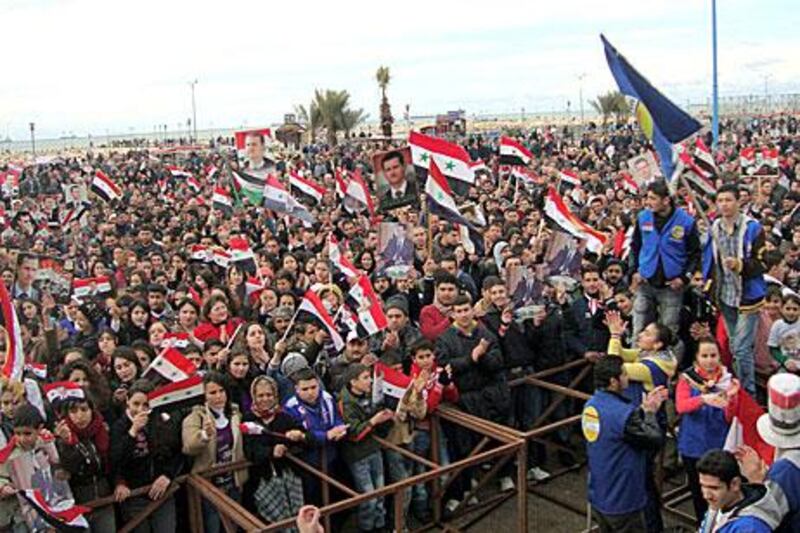DAMASCUS // Supporters of the Syrian president hailed it as a masterful display, outlining a clear vision of the future for a crisis-hit land. But Bashar Al Assad's critics, and even the few remaining moderates, saw his fourth national address as a final nail in the coffin of hopes for a peaceful settlement.
In a speech on Tuesday, followed by a rare personal appearance alongside his wife and children at a mass rally of adoring loyalists in Damascus the next day, Mr Al Assad pledged to use an "iron fist" against his "terrorist" enemies and proclaimed victory was at hand.
Political reforms were under way, he said, but would not be hurried, and he made it clear there would be no "new" Syria.
No mention was made of a possible presidential election or any commitment to limits being placed on the absolute power with which his family has ruled for four decades.
"It has now been 10 months of this crisis and it seems they have learnt nothing, we've moved backwards, not forwards," said a veteran political dissident who has mediated between security forces and protesters to try to prevent bloodshed.
Until Mr Al Assad's latest speech he had been continuing - if forlornly - to try to broker a political compromise that would bring about peaceful reforms to Syria's autocratic system of governance.
"It's the same rhetoric - even harder than before - it is the same 'solutions' that have already failed," the dissident said. "We can be under no illusions now, there will be no change, we are stuck on this course."
The Arab League plan designed to halt the violence has instead only heightened that sense of despair. The league's observer mission is unravelling. Two monitors have already quit and more may follow suit.
Previous addresses by Mr Al Assad - in March, April and June - had all been accompanied by some degree of anticipation that a grand gesture of reform or step towards reconciliation might be about to take place and save the situation.
Although there had been some half-hearted media speculation that the Syrian president would use this latest speech to announce a national unity government, including opposition figures, when news broke late on Monday that Mr Al Assad would address the nation the following morning, it was greeted largely with indifference.
"With the previous speeches there was some lingering hope, despite all the facts, that real political decisions were going to be made," said one Syrian analyst. "But with this one, I had no hope, no expectation. It wasn't important, I knew there would be nothing new in it."
In a middle-class suburb on the southern edge of Damascus, a 35-year-old father of two who keeps a careful eye on domestic and international politics - and who had gone out of his way to watch previous speeches and interviews with Mr Al Assad - missed the address.
"There was a power cut so I couldn't watch," he said. "I saw some highlights afterwards and what can I say, it's nice to know the regime thinks the crisis is almost over but no one else seems to."
He cited a growing sense of insecurity amid spreading violence, the declining value of his fixed state salary and the experience of watching his extended family slide closer to poverty.
"If this is almost over, why is there no electricity, why can't I get gas to cook with, why is petrol so expensive, why are schools closed, why is it now too dangerous for me to travel around my own country?" he said. "The situation is bad and it will get worse, I'm afraid that's the truth."
Underlining the deep divisions in Syria between those with and those against the regime, a staunch supporter of Mr Al Assad living in the same middle-class Damascus neighbourhood professed his delight with the speech. "It was great," he said, sitting in his office, darkened and cold because of power cuts and fuel shortages. "The president is a good man and a clever man, the army is strong, there is nothing for us to fear."
Sana, the official news agency, carried stories in which ordinary Syrians and political analysts praised the address as historic, calm, accurate and self-confidence. "Citizens stressed that President Al Assad's speech was transparent and clear, reflected the will of the Syrian people and shaped the next phase of the future vision on Syria," one story said.
In central Damascus, a Syrian Kurd who wants to see real reforms but without violence or foreign military intervention, quietly and sadly said his country was sliding towards war.
"We wanted the regime to move from the security arena to the political arena and I had expected the president to have led that. He's young and could have made that change but he has decided on the security line and had not moved from it," he said. "This speech will push the opposition to be more radical and the loyalists to be more radical. We now have hard-line loyalists and hard-line opposition and there is no voice of reason any more."
psands@thenational.ae





